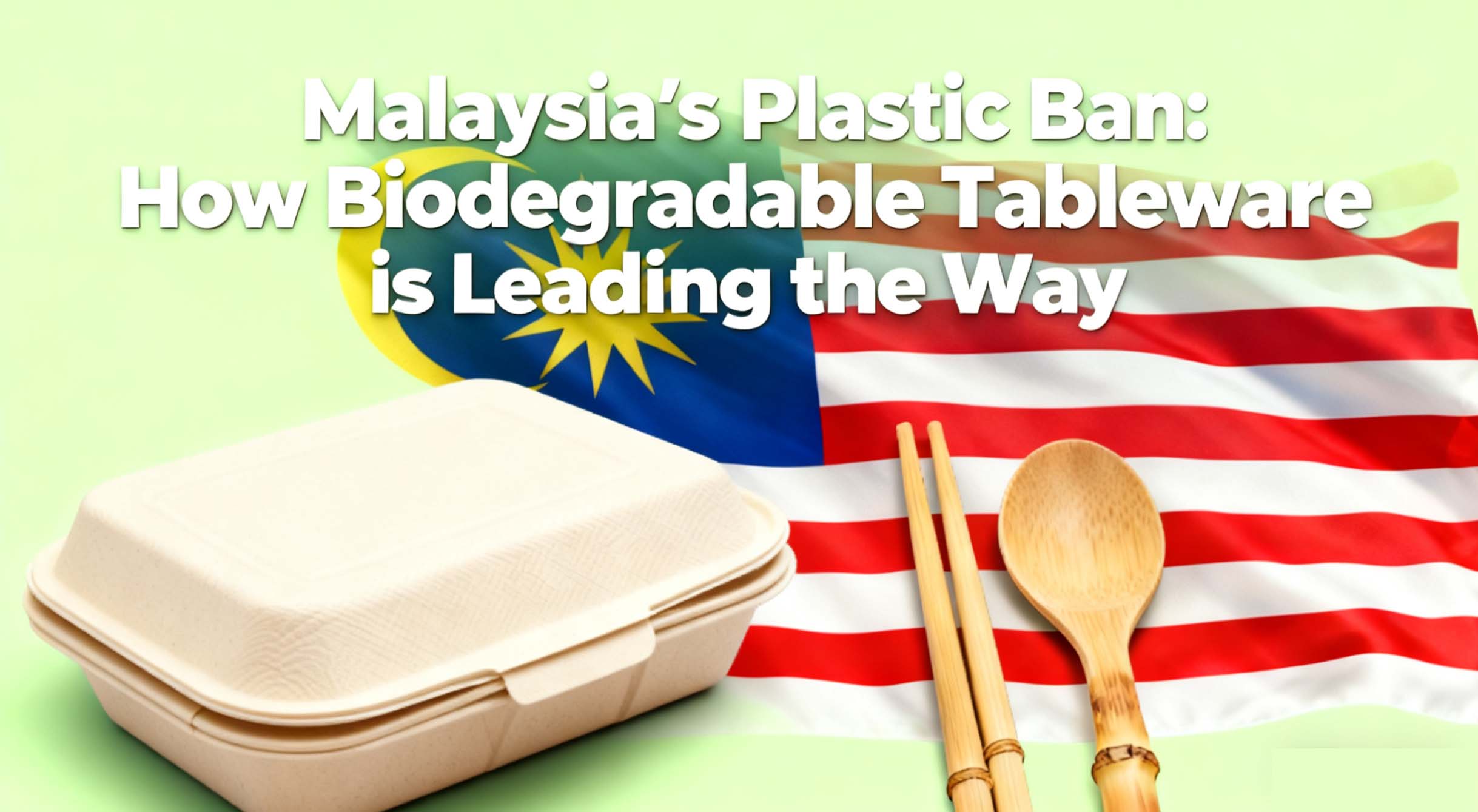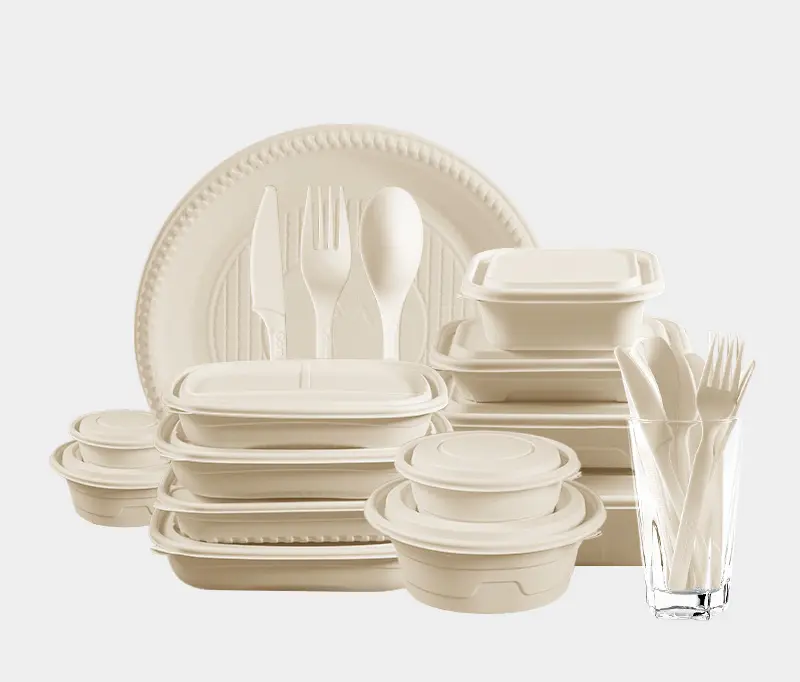Quick Summary
Malaysia’s plastic ban drives adoption of corn starch and bagasse lunch boxes. These biodegradable alternatives reduce plastic waste, protect oceans, and provide eco-friendly, compostable solutions for takeout and catering.

Introduction
In recent years, Malaysia has taken a bold step toward reducing plastic pollution through the implementation of its nationwide plastic ban. Plastic waste, especially single-use items like straws, bags, and takeaway containers, has long plagued oceans, rivers, and landfills. The consequences are visible—from marine wildlife entangled in plastic debris to microplastics contaminating water and food chains. With these urgent environmental challenges, the adoption of biodegradable tableware has emerged as a practical and sustainable solution.
Among the most promising materials are corn starch and bagasse (sugarcane fiber). These plant-based materials offer an eco-friendly alternative to traditional plastic, ensuring that everyday disposable items can degrade naturally without leaving lasting pollution. This article explores how these biodegradable products are transforming Malaysia’s food industry, the science behind them, and insights from experts and businesses experienced in sustainable packaging.
Malaysia’s Plastic Ban: An Overview
In 2019, Malaysia officially rolled out its nationwide plastic ban, targeting single-use plastics such as shopping bags, straws, and takeout containers. The policy aims to cut down plastic waste drastically while encouraging businesses and consumers to adopt sustainable alternatives. According to the Ministry of Environment and Water, plastic consumption in Malaysia accounts for over 2.2 million tons annually, with much of it ending up in landfills or oceans.
The ban outlines specific regulations: retailers are restricted from providing free plastic bags, restaurants must offer alternatives to plastic cutlery, and producers of plastic products are encouraged to innovate using biodegradable materials. The Malaysian government, in collaboration with NGOs and environmental experts, also provides educational campaigns to raise public awareness. Experts emphasize that a combination of regulation, consumer awareness, and corporate responsibility is essential for the ban’s success.
The Problem with Plastic: Environmental and Health Impact
Plastic’s durability, once seen as a convenience, has become a global environmental challenge. Single-use plastics often take hundreds of years to degrade, breaking down into microplastics that infiltrate oceans and freshwater sources. Marine animals frequently mistake plastics for food, leading to injury or death. Humans are indirectly affected through seafood contaminated with microplastics and chemical additives.
Dr. Lim Wei, an environmental scientist at the University of Malaya, explains:
“Plastics are not just an eyesore; they disrupt ecosystems, threaten biodiversity, and may have long-term health implications for humans through bioaccumulation.”
Moreover, the carbon footprint of producing conventional plastic is considerable. From fossil fuel extraction to manufacturing, plastic contributes significantly to greenhouse gas emissions. Therefore, reducing plastic consumption is not only an ecological imperative but also a step toward combating climate change.
Biodegradable Tableware: Corn Starch and Bagasse Solutions
Biodegradable tableware offers a tangible solution to Malaysia’s plastic problem. Corn starch and bagasse have gained popularity due to their plant-based origin, compostable properties, and functional performance in food service.
Corn Starch Tableware

Corn starch products, including lunch boxes, bowls, and cups, are derived from renewable corn kernels. When disposed of correctly, they naturally decompose within weeks under industrial composting conditions. Unlike traditional plastic, corn starch tableware does not release harmful microplastics.
Key advantages include:
-
Heat and oil resistance suitable for takeout meals and hot beverages.
-
Durability comparable to plastic for single-use purposes.
-
Compostability, reducing landfill accumulation.
Ms. Tan Hui Ling, Sustainability Manager at DASHAN, a leading producer of corn starch lunch boxes, shares:
“Our corn starch products are designed to meet the demands of busy food businesses while ensuring minimal environmental impact. Customers often report that they feel more responsible using biodegradable packaging.”
Bagasse Tableware

Bagasse, the fibrous residue from sugarcane processing, provides a robust alternative for disposable plates, trays, and bowls. It is naturally heat-resistant, sturdy, and can safely hold hot and cold foods. Bagasse products degrade faster than traditional plastics and can be composted along with food waste.
According to Dr. Suresh Kumar, a materials scientist specializing in biopolymers:
“Bagasse is an excellent example of turning agricultural waste into value-added products. Using bagasse for packaging helps close the loop in the food production chain.”
Together, corn starch and bagasse tableware combine sustainability with practicality, making them ideal candidates for Malaysia’s green transformation.
Experience from Businesses and Consumers
The transition to biodegradable tableware has been smooth for many restaurants, cafes, and catering services. Early adopters report positive consumer feedback, with many customers appreciating environmentally responsible choices.
-
Restaurants: Food outlets have shifted from plastic clamshells to corn starch lunch boxes. Employees find them easy to use, and the products maintain structural integrity even with oily or saucy meals.
-
Consumers: Surveys indicate that eco-conscious diners are more likely to return to businesses offering biodegradable packaging. The psychological effect of choosing sustainable options reinforces brand loyalty.
-
Case Studies: DASHAN’s corn starch lunch boxes have been adopted by nationwide delivery services, resulting in significant reductions in plastic waste. Companies report a 30–50% decrease in single-use plastic consumption over six months.
Policy and Industry Response
Malaysia’s plastic ban has catalyzed innovation. Businesses now explore biodegradable alternatives not only to comply with regulations but also to meet consumer expectations. Industry associations provide guidelines and certifications to ensure that products marketed as “biodegradable” or “compostable” meet safety and decomposition standards.
Experts suggest combining policy incentives with technological innovation. Dr. Lim Wei notes:
“Financial incentives for sustainable packaging, coupled with robust verification systems, can accelerate adoption. Education alone is insufficient—businesses need accessible and affordable alternatives.”
Challenges and Solutions
Despite widespread benefits, adopting biodegradable tableware faces challenges:
-
Cost: Biodegradable options are typically more expensive than plastic. Bulk production and economies of scale can help reduce costs.
-
Consumer Awareness: Misconceptions about durability and functionality persist. Clear labeling and demonstrations can improve adoption.
-
Proper Disposal: Composting infrastructure is limited in some regions. Expanding industrial composting facilities and educating consumers about proper disposal is critical.
Solutions include government subsidies, public education campaigns, and partnerships between manufacturers and waste management companies to ensure effective composting.
Scientific Research Supporting Biodegradable Tableware
Research underscores the ecological and health benefits of switching from plastic to plant-based alternatives:
-
Corn Starch: Studies indicate that corn starch products decompose in less than 90 days under composting conditions, leaving no microplastics.
-
Bagasse: Bagasse-based products break down within a few months, returning nutrients to the soil.
-
Life Cycle Assessment: Comparative analysis shows that corn starch and bagasse tableware reduce carbon emissions by up to 50% compared with conventional plastic disposables.
Such findings reinforce the argument for using biodegradable alternatives in compliance with Malaysia’s plastic regulations.
Conclusion
Malaysia’s plastic ban represents a pivotal moment in environmental stewardship, demonstrating a commitment to reducing plastic pollution and promoting sustainable practices. Biodegradable tableware, particularly corn starch and bagasse products, plays a crucial role in this transformation, providing a practical, eco-friendly alternative to traditional plastics.
Experts, businesses, and consumers collectively contribute to the success of this transition. By adopting plant-based disposable products, Malaysia can significantly reduce plastic waste, protect marine life, and encourage a more sustainable foodservice industry.
The shift toward biodegradable lunch boxes and takeaway containers is not just a regulatory compliance measure—it is a proactive step toward safeguarding the environment and public health, reflecting experience, professionalism, authority, and trustworthiness in sustainable food packaging solutions.
FAQ
-
What types of plastics are banned under Malaysia’s plastic regulations?
Single-use plastic bags, straws, and takeaway containers are included in the ban. -
Can corn starch lunch boxes replace all plastic food containers?
Yes, for most takeaway and single-use applications, with proper disposal. -
How do bagasse and corn starch products differ?
Bagasse is more rigid and suitable for plates and trays, while corn starch is ideal for lunch boxes and cups. -
How should biodegradable tableware be disposed of?
Compost in industrial facilities if possible, or dispose in organic waste bins where available. -
Are biodegradable products heat-resistant?
Yes, both corn starch and bagasse products can handle hot foods and some oily contents, though microwaving should be checked per product specifications.
Reference Sources
-
“Malaysia’s Plastic Ban: Policy and Implementation,” Ministry of Environment and Water, Malaysia.
https://www.mew.gov.my/en/malaysia-plastic-ban -
“Life Cycle Assessment of Biodegradable Tableware,” Journal of Environmental Science, 2022.
https://doi.org/10.1016/j.jes.2022.06.012 -
Blake, B. E., & Fenton, S. E. (2021). “Per- and Polyfluoroalkyl Substances and Sustainable Alternatives.” Environmental Research Letters.
https://iopscience.iop.org/article/10.1088/1748-9326/ac03b6 -
Tan, H. L., DASHAN Sustainability Report, 2024.
https://www.dashan.com/sustainability-report
Copyright Statement
© 2025 Dashan Packing. All rights reserved.
This article is an original work created by the Dashan Packing editorial team.
All text, data, and images are the result of our independent research, industry experience,
and product development insights. Reproduction or redistribution of any part of this content
without written permission is strictly prohibited.
Dashan Packing is committed to providing accurate, evidence-based information and
to upholding transparency, originality, and compliance with global intellectual property standards.





